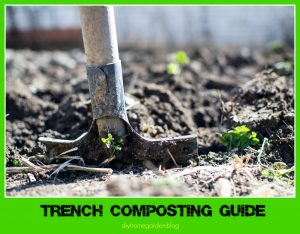What would happen to you if you experienced the devastation of a flood, hurricane, or tornado? Do you have the survival skills you’d need in case of an attack on our power grid? Most people do not.
You learn the intellectual skills you need for life in school. But what about learning how to survive an emergency? Fortunately, learning is a lifelong endeavor, and you have the time to become a home prepper (at least the basics!) and survivalist.
13 Survival Skills Everyone Should Know (these are the bare basics!)
1 – Composting
Your food waste is trash to you but golden for gardening! If you find yourself in a time when you need to grow your own food, then you’ll need to nourish your plants. But what if you can’t access commercial fertilizers. Or what if you simply prefer going organic? Composting is the perfect answer. Once you learn how easy it is to compost your vegetable and food scraps, you will be able to grow vigorous edible plants.
The easiest way to get started–trench composting! All you need is a shovel and a vacant spot of land.
2 – How to grow your own fruits and vegetables
An emergency situation could leave you without access to grocery stores. For instance, down power lines could make roads impassable for days on end. But if you had a garden from which you could harvest some fresh fruits or veggies, you would have a nutritious and renewable food source. This idea becomes especially urgent in a long-term emergency.
3 – Catching fish (this is one of the survival skills that will provide protein)
I never learned the art of fishing until about ten years ago. I was laid off from a job and went along with my husband to kill one day. One try, and I was hooked. Pun intentional. Besides the relaxing day on the pond, I realized that fishing allowed me to cut down on the household grocery bill by catching fish a day or two each week.
4 – Hunting
Besides fishing, you should also learn how to hunt for your food. Okay, I admit I’m squeamish, and I’m a huge animal lover. However, harvesting at least one deer per season allows us to pack our freezer with lots of free meat every fall. Better yet, I learned how to butcher the meat myself and no longer pay a processor to do the dirty work. To be honest, here’s what usually happens in my household. My hubby, who loves hunting, pulls the trigger and dresses the meat. After he brings it home, I butcher and pack the cuts of meat.
From a preparedness standpoint, make sure to have plenty of ammunition on hand or a backup method of hunting–like a crossbow, for example.
Here’s another idea–find a hunter who will trade you for fresh fruits and veggies.
5 – Seed saving
The work does not end after you grow your garden and harvest the goodies. The work does not end. That’s because you should also learn how to collect the seeds, dry them for the next season, and save them for the next planting.
Seed saving requires you to invest in non-GMO seeds to propagate the subsequent crops. In some temperate regions, you could turn crops twice per year.
6 – How to forage for edible plants
Your yard is a treasure trove of edible plants if you know what to look for and how to use them safely. For example, the puffy white clover that you try to remove from your lawn makes a nutritious tea and a scrumptious jelly (tastes like honey!). Also, dandelions are edible as a salad green or steeped as a tea. Also, mushrooms can be highly nutritious, if you know what to look for. You can find extensive videos on the topic of mushroom harvesting.
7 – How to filter water (the most essential of ALL the survival skills)
What if you had to get water from a nearby creek or river? Or how about when you must tap into your emergency stash of indoor water? While it might look fresh and clear, it contains microscopic particles that you must filter before using it. Filtering water is one of the most critical survival skills that could save your life.
8 – Herbs that double as medicines
Knowing how to use herbs as medicines is nothing new to humankind. For centuries, Eastern healers and naturopaths have used herbal medicines to treat everything from stomach issues to sinus infections to wounds. In the event that you cannot get to a doctor, herbal medicines are well worth a try.
9 – First aid (one of the survival skills you MIGHT have learned in school but long since forgotten)
Since we are talking about staying healthy, consider brushing up on your first aid knowledge. If you are in a life and death situation, it could be helpful to to know what to do if someone suffers an injury, passes out, or needs further medical attention. So take a CPR class, learn first aid, and stock an emergency first aid kit.
10 & 11 – Dehydrating food and home canning
When your garden starts to come in, you will get lots of fresh foods all at once. Don’t waste the bounty! Instead, learn how to dehydrate those goodies or can them for future use. These food storage methods let you keep food for the off-season…just in case!
12 – Beekeeping
I admit that this is one of my shortfalls. As a severe bee allergy person, I’ll pass on this one. Nevertheless, honey is the only food that NEVER spoils. It’s an effective sweetener and a natural antimicrobial and antibiotic. If you’re allergic to bees like me, consider making friends with a beekeeper and strike up a barter deal. Perhaps you can trade some of those yummy canned foods for some honey?
13 – Basic sewing skills (some survival skills can also be a fun hobby)
Basic sewing skills were part of public school education once upon a time. Now, it’s an elective course that many students don’t bother to take. In a prolonged emergency, basic sewing proves to be an efficient skill. You can keep your clothing in good repair or even pass the time stitching away. Besides that, you would have a marketable trade to barter in the event of a total breakdown of services.
It’s Never Too Late to Learn These Survival Skills (as Long as You Don’t Wait for an Emergency!)
Fortunately, you can take steps to learn these essential survival skills. Just don’t wait for an emergency. The time for preparedness is now. What survival skills do you find the most critical? Join our discussion on MeWe and Facebook. We’d love to hear. Until the next time, have a happy DIY day.



